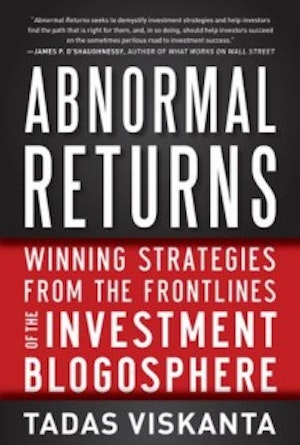
1. Abnormal Returns by Tadas Viskanta (McGrawHill, 2012)
Tadas Viskanta is the foremost presence in the financial blogosphere. Head of AbnormalReturns.com, Viskanta’s book has a clear message for investors: Slow down. He describes how “breathless” financial networks and the deluge of market information are not always real “news” at all–much of it is be spoon-fed to those who are simply looking for more ways of “getting in on the action.” Viskanta notes, however, that investing–perhaps unlike the pejorative term “trading”–is boring.
Well, sort of. Viskanta cautions against the old pastime of armchair investors (and some professionals), namely, that of “forecasting the future.” As a remedy for this news-cycle-inspired forecasting, he leads his readers clearly and logically through the basics of risk, equities, portfolio management, and ETFs. Viskanta describes how to beat the market without being bogged down with forecasting the future. This is a must-read for any investor.
2. The Alpha Masters by Maneet Ahuja (Wiley, 2012)
One of the most dynamic young people in finance, Maneet Ahuja has done some of the most high quality reporting on hedge funds recently. As a producer on CNBC’s “Squawk Box,” she recognized the dynamic insight of the best hedge fund managers as one of the best pieces of information available to everyday investors. In 2011, she is the co-creator of “Delivering Alpha” Conference, and her latest book The Alpha Masters describes what hedge funds are, the people who manage them, and why the anatomy of a good trade or investment lies behind them.
For example, Ahuja details Ray Dalio, manager of Bridgewater Associates, who is an avid meditator and a self-proclaimed “hyperrealist.” Bridgewater, the enormous fund conglomerate favored by pensions more than any other hedge fund, embodies a financial philosophy summarized in Dalio’s Principles, a set of various aphorisms.The intrepid freethinker that Ahuja describes here mirrors how all successful investors make their living–by thinking for themselves. This is only one of the many hedge fund managers that breaks the stereotypical mold, and Ahuja draws some important lessons from her poignant interviews with the most influential fund managers around, including John Paulson, David Tepper, and Bill Ackman. If you are follower of our website, you should read this book.
3. You Can Be a Stock Market Genius by Joel Greenblatt (Fireside, 1999)
Though written more than a decade ago, Joel Greenblatt’s book You Can Be a Stock Market Genius brilliantly stresses the importance of doing one’s homework in investing maintaining a diverse set of investment ideas. Manager and founder of his own hedge fund Gotham Capital, Greenblatt sustained an average annual return of 50 percent from 1985 to 1994. Today, his portfolio includes the likes of Dell (NASDAQ:DELL), Microsoft (NASDAQ:MSFT), and KLA-Tencor (NASDAQ: KLAC). He cites no magic behind his success–just a steady stream of working through 10Ks, 10Qs, Form 10s, and 13Ds, coupled with a genuine interest in one’s own investment.
Greenblatt humbly admits that he does not have the oracle-like capabilities of a Warren Buffett–he notes that it is difficult for him (or you) to pick out an everyday, normal company that is going to see major capital appreciation. That’s why he proposes a simple principle: Pay attention to change. Mergers, spin-offs, restructurings, and the like cause the alleged “efficient market” to be, well, inefficient, creating undervaluation and, for the studious investor, profit. Additionally, paying attention to people close to the company–and how they are incentivized to maximize shareholder returns–is a quick litmus test for the health of a company that is available to anyone willing to search the SEC Edgar database.